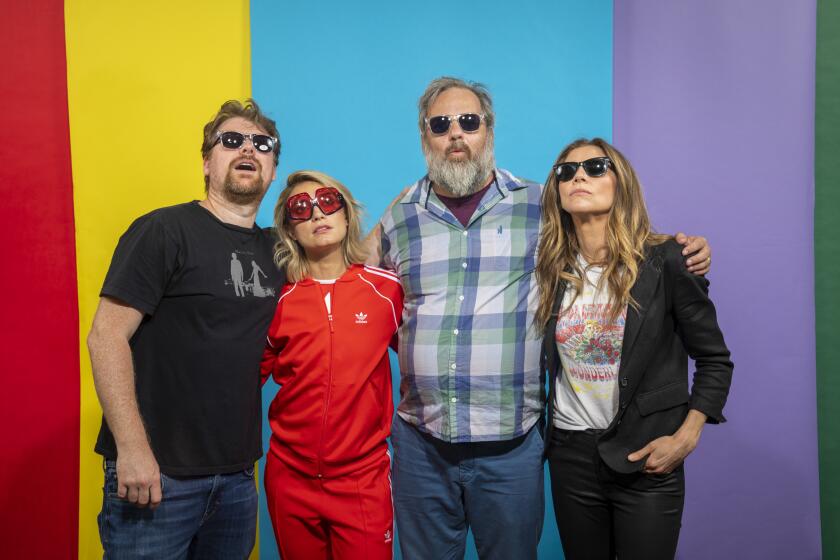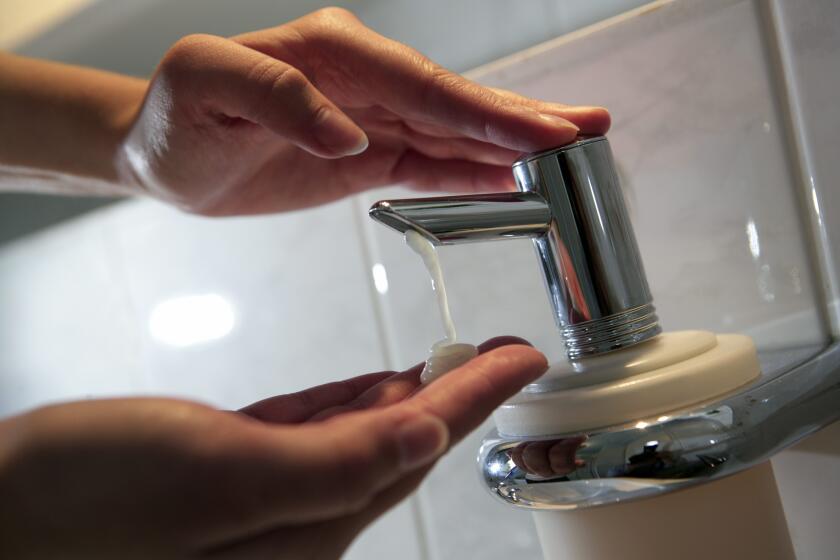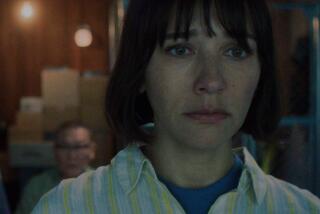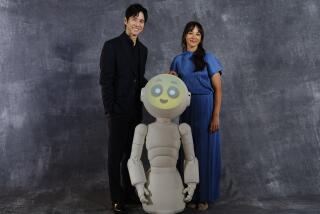‘Rick and Morty’ team has a new TV show: Your ‘Solar Opposites’ questions, answered
- Share via
This story contains spoilers from the first season of “Solar Opposites.”
In “Solar Opposites,” four aliens who escaped their exploding home planet are trying to navigate life among humans in an American suburb.
As in the live-action comedy “3rd Rock From the Sun,” the team’s composition resembles a classic sitcom family: Korvo and Terry, voiced by Justin Roiland and Thomas Middleditch, respectively, are the adult alien “parents.” The “kids,” Yumyulack (Sean Giambrone) and Jesse (Mary Mack), are their replicants — grown from pieces of the adults planted in a special soil. Their mission is to watch over an infant-like genetic supercomputer called the Pupa.
Co-created by “Rick and Morty’s” Roiland and Mike McMahan, the animated sitcom is permeated with pop culture references and pokes fun at familiar tropes. The eight-episode first season is out now on Hulu.
“It’s a fun way to critique the stuff we don’t love in the real world. But it’s also a fun way to poke fun at ourselves,” McMahan said of the series during a recent phone call. “Terry loves the trashy fun things. Everything we all kind of love about Earth but maybe aren’t proud of, like food and movies and TV and celebrity worship and gossip … and consumerism.”
In a wild, wide-ranging interview earlier this summer at San Diego Comic-Con — beginning with the eternal struggle over how to hold a microphone — the cast and creators of “Rick and Morty” of course landed on the subject every fan of the Adult Swim animated series wants to talk about: Pickle Rick.
Everything about humanity excites Terry. Korvo, on the other hand, hates Earth and is focused on the mission. Almost.
“A lot of the time Korvo is claiming he hates everything, but you’re getting a glimmer that he wants to be included,” said McMahan. “We all have a little bit of a Korvo in us where you’re kind of an introvert, you don’t always like to go out, but you want people to want you to go out.”
Jesse and Yumyulack each take after their parent in their views about humanity, and none of them is an expert.
Roiland and McMahan had started working on the show, originally developed for Fox, during the break between Seasons 2 and 3 of “Rick and Morty.” “Solar Opposites” landed at Hulu after the network passed.
The move to the streamer opened up new creative possibilities for the show beyond the freedoms its TV-MA rating allows in terms of language and content.
“Because we are doing it for streaming, we have the luxury of looking at certain aspects of the show from a more serialized perspective,” Roiland said.
Knowing that all of the episodes would be released at once, with viewers able to watch episodes in the intended order, allowed them to weave in an ongoing subplot involving a dystopian society of miniaturized humans trapped by Jesse and Yumyulack inside a wall in their room.
This idea of depicting a microcosm of humanity through a human ant farm had excited Roiland from very early on in the show’s conception.
“They just did something to the kids,” said Roiland. “They were snotty or rude … for any number of reasons these adults ... with the wrong kids and they ended up in the wall and now they’re having to sort of re-create society in there and I remember being so excited” about it.
“We kept talking about [how] it would be funny if the sci-fi throwaway things [that the aliens] did had repercussions” added McMahan.
Despite the more political themes touched on in this story line pitting the wall’s haves against the have-nots, the show’s most topical message is that there can be terrible consequences if you don’t wash your hands.
“The cartoons come second. We make the cartoons to push the hand-washing agenda, so I’m glad you caught that,” McMahan said.
To help prevent the spread of coronavirus, the CDC recommends washing your hands for 20 seconds, or “Happy Birthday” sung twice. Here are 10 way better songs to sing.
In “The Booster Manifold,” the fourth episode of the series, Jesse and Yumyulack assume that the plants that have sprouted from their heads are “a puberty thing.” Classmates exposed to their pollen start to like them and they cannot be more pleased.
But then the human teens start viciously attacking each other.
“You’re not a human. You don’t get to have a puberty,” Korvo explains during the episode. “This is just fungus you get for not washing your hands.”
“You gotta wash those hands!” Terry adds.
“Justin and I have always had really good hand hygiene. We were on this boat way in advance,” said McMahan. “We’re big hand washers.”
“It takes me about two hours to properly wash my hands,” Roiland added. “Phones are gross too. You gotta wash those phones.”
Audiences have been increasingly quick to point out when real-life news headlines start to mirror story lines from their favorite cartoons. Just last week “The Simpsons” was credited with predicting the emergence of so-called murder hornets.
The “Solar Opposites” team was happy to riff on their coincidence, but they did not actually predict that the series would arrive at a time when the importance of hand washing is on everybody’s minds because of a global pandemic.
“No, of course we didn’t know at the time. We just loved that that’s where [the plants] would come from,” said executive producer Josh Bycel, who wrote the episode, in a phone interview.
In Netflix’s “The Midnight Gospel,” premiering Monday, “Adventure Time” creator Pendleton Ward partners with Duncan Trussell to explore the cosmos.
According to him, the actual motivation for that story line was their desire to tell a story about what Jesse and Yumyulack think is puberty. Since they see it happening to the human kids, they think their bodily changes are puberty, too. And like all “Solar Opposites” episodes, they approached it through a sci-fi lens.
“They are made of plants, so how would puberty happen to them? Maybe they would grow plants out of their heads, or a weed,” Bycel said of the idea’s development. “It was the first chance in the show for us to really do a fun teenage kid B-story that really involved the two of them.”
He explained that because animation has such a long lead time — an episode takes nine months to a year from start to finish — the timeliness of the message was just luck.
“It’s amazing, in all the animated shows I’ve worked on, how often it happens. Where there’s just a joke about somebody or something and then it ends up being very timely. You can’t plan for that stuff,” said Bycel.
“I think Middleditch might have improved it, but I love that [Terry] says, ‘You gotta wash those hands.’ Now it’s become a public service announcement.”
More to Read
The complete guide to home viewing
Get Screen Gab for everything about the TV shows and streaming movies everyone’s talking about.
You may occasionally receive promotional content from the Los Angeles Times.









